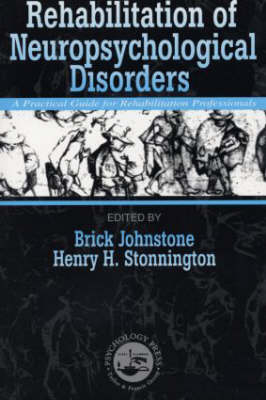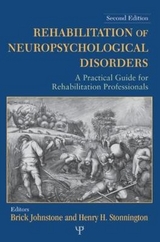
Rehabilitation of Neuropsychological Disorders
A Practical Guide for Rehabilitation Professionals
Seiten
2002
Psychology Press Ltd (Verlag)
978-1-84169-063-6 (ISBN)
Psychology Press Ltd (Verlag)
978-1-84169-063-6 (ISBN)
- Titel erscheint in neuer Auflage
- Artikel merken
Zu diesem Artikel existiert eine Nachauflage
Provides an overview of standard neuropsychological treatment strategies for specific cognitive impairments that are identified on testing. This book proposes a taxonomy of relatively unitary cognitive constructs and lists tests which may be used to assess each cognitive construct, and provides specific rehabilitation strategies.
Many contemporary neuropsychology texts focus on neuropathology, the description of specific tests, and the differential diagnosis of central nervous system disorders. However, increasingly sophisticated neuroradiological techniques, managed care factors, and the growth of rehabilitation necessitates that rehabilitation professionals provide more functionally (versus diagnostically) useful evaluations to improve the neuropsychological functioning and community integration of persons with brain injuries or diseases. This book aims to fill this gap and to provide an overview of standard neuropsychological treatment strategies for specific cognitive impairments that are identified on testing. The new edition enhances this goal with three chapters outlining important recommendations, services, and issues for rehabilitation professionals.
Written by a team of experienced scientists and professionals, the volume provides a universal taxonomy of neuropsychological abilities (emphasizing relatively simple terms), with a list of basic rehabilitation strategies to improve impairments identified in general cognitive domains. Specific chapters are included on the neuropsychological remediation of memory, attention, language, visual-spatial skills, and executive function impairments. Each chapter proposes a taxonomy of relatively unitary cognitive constructs (e.g., divided attention, sustained attention, focused attention), lists tests which may be used to assess each cognitive construct, and provides specific rehabilitation strategies to improve or accommodate the identified neuropsychologial impairments. The final chapters cover basic resources and issues of which the rehabilitation professional needs to be aware (vocational rehabilitation, disability determination, and guardianship issues). This book provides a wealth of useful information for family members, rehabilitation professionals, and others who work with persons with brain injury in improving the community func
Many contemporary neuropsychology texts focus on neuropathology, the description of specific tests, and the differential diagnosis of central nervous system disorders. However, increasingly sophisticated neuroradiological techniques, managed care factors, and the growth of rehabilitation necessitates that rehabilitation professionals provide more functionally (versus diagnostically) useful evaluations to improve the neuropsychological functioning and community integration of persons with brain injuries or diseases. This book aims to fill this gap and to provide an overview of standard neuropsychological treatment strategies for specific cognitive impairments that are identified on testing. The new edition enhances this goal with three chapters outlining important recommendations, services, and issues for rehabilitation professionals.
Written by a team of experienced scientists and professionals, the volume provides a universal taxonomy of neuropsychological abilities (emphasizing relatively simple terms), with a list of basic rehabilitation strategies to improve impairments identified in general cognitive domains. Specific chapters are included on the neuropsychological remediation of memory, attention, language, visual-spatial skills, and executive function impairments. Each chapter proposes a taxonomy of relatively unitary cognitive constructs (e.g., divided attention, sustained attention, focused attention), lists tests which may be used to assess each cognitive construct, and provides specific rehabilitation strategies to improve or accommodate the identified neuropsychologial impairments. The final chapters cover basic resources and issues of which the rehabilitation professional needs to be aware (vocational rehabilitation, disability determination, and guardianship issues). This book provides a wealth of useful information for family members, rehabilitation professionals, and others who work with persons with brain injury in improving the community func
Johnstone, Stonnington, Introduction. Skeel, Edwards, The Assessment and Rehabilitation of Memory Disorders. Callahan, The Assessment and Rehabilitation of Executive Disorders. Levitt, Johnstone, The Assessment and Rehabilitation of Attention Disorders. Shaw, The Assessment and Rehabilitation of Visual-Spatial Disorders. Holland, Larimore, The Assessment and Rehabilitation of Language Disorders. Shigaki, National and Community Resources for Neuropsychological Disorders.
| Verlagsort | Hove |
|---|---|
| Sprache | englisch |
| Maße | 152 x 229 mm |
| Gewicht | 163 g |
| Themenwelt | Medizin / Pharmazie ► Medizinische Fachgebiete ► Neurologie |
| Medizin / Pharmazie ► Physiotherapie / Ergotherapie ► Rehabilitation | |
| ISBN-10 | 1-84169-063-5 / 1841690635 |
| ISBN-13 | 978-1-84169-063-6 / 9781841690636 |
| Zustand | Neuware |
| Haben Sie eine Frage zum Produkt? |
Mehr entdecken
aus dem Bereich
aus dem Bereich
interdisziplinäre Diagnose- und Behandlungsstrategien
Buch | Hardcover (2024)
Urban & Fischer in Elsevier (Verlag)
CHF 135,75
Buch | Hardcover (2024)
Springer (Verlag)
CHF 195,95
Material für visuell Lernende
Buch | Softcover (2023)
Kohlhammer (Verlag)
CHF 61,60



